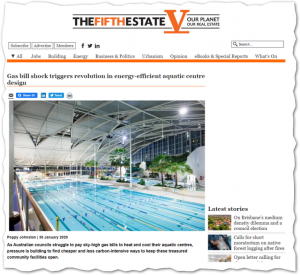Solaire Properties Passive House a subtropical Passive House “Solaire Properties is close to completion of what it claims is the world’s first subtropical passive house. The Brisbane-based property development company engaged Joe Adsett Architects to design the 380-metre square home in Auchenflower, Brisbane.” Note that although it is not the ‘world’s first subtropical passive house’ it is the first in …
Better buildings easier than better cows

Although we have the Thinkstep report showing that New Zealand’s built environment contributes only 20% of our overall carbon emissions (compared to 40% for the USA and much of Europe) this is still significant. We are unique for a developed country in that we produce a lot of emissions from farming. Designing buildings to be energy efficient and reducing their embodied …
Niche public facilities an obvious target for energy-efficient design

Public swimming pools: a niche type of building but important community fixtures. They are also invariably shocking gluttons for energy thanks to stupid design (or stupid decisions by those commissioning them, who have valued form and overlooked function). As I read this, all I could think about was how the ‘standard approach’ to designing buildings—even big, flash public ones—is simply …
Work harder, commit more to decarbonising public assets

Some interesting analysis here, although you have to read carefully to see the high-performance building connection. Of the $12 billion in infrastructure spending announced last week, $200 million has been allocated for “decarbonisation” of some public assets. That’s only 1.6 % and I and others would argue that we need to work harder on reducing the carbon footprint of existing …
Handy list of trained installers
Here is the list of folks that have, at least, taken the two-day training course. If you are searching for someone in your area that knows how to build a quality air control layer, this is a good place to look. pro clima Certified Installers —29 Jan 2020
Energy Ratings Deliver Higher Sale Prices For High-Performing Homes

Homebuyers do care about energy efficiency and energy rating schemes for homes show a price premium for high-performing homes, says this Australian author. The problem is the ACT is the only Australian state with a mandatory scheme. As homes and buildings are, in general, one of the few profitable paths to zero carbon (ie we can save money while drastically …
Cost of construction to Passive House level falling in UK

8% more: that’s the extra cost in the UK for building to the Passive House standard, according to this report. That is quite good. The most important factors in containing costs are: simple form; modest glazing; and an experienced team—in particular, experienced clients. Is it noteworthy that the majority of the projects in this study were social housing, not bespoke …
Every house a Certified Passive House by 2030

There are about 30,000 new houses a year currently built in New Zealand. In a decade, could they all be certified Passive House? I think it can be done but the biggest barrier won’t be money, construction materials or staff availability. It will be training. Building a Certified Passive House is hard—the first time. Then once you’ve done a few, …
Carbon-positive landscapes too

The basic idea? The chosen materials and landscape components sequester carbon to balance out the carbon it took to create it, all within five to 20 years. (Five for greener projects like parks, gardens, campuses and mixed-use developments, with up to 20 years for more urban projects.) The important new development is that they’ve run the numbers: it is possible …

